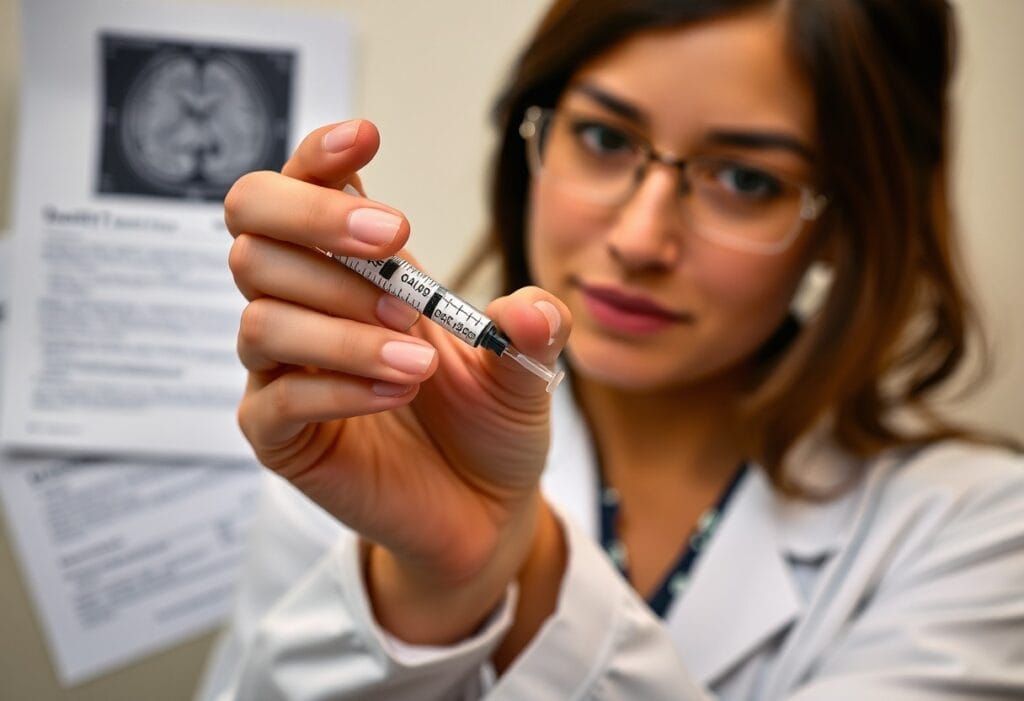Most women using Depo-Provera as a contraceptive method may be unaware of the potential link between this injection and brain tumors. It’s necessary for you to understand the risks involved and advocate for your health by speaking up about your experiences. With research suggesting a connection between hormonal contraceptives like Depo-Provera and serious health issues, including tumors, your voice plays a vital role in increasing awareness and pushing for more comprehensive studies. Stay informed and empowered about your body and health choices.

Understanding Depo-Provera
Your understanding of Depo-Provera is important for making informed decisions about your health. This injectable contraceptive is administered every three months to prevent pregnancy, offering a convenient alternative to daily birth control pills. However, it’s important to recognize both the benefits and potential risks associated with this form of contraception.
What is Depo-Provera?
Along with its primary function as a contraceptive, Depo-Provera contains the hormone progestin, which mimics natural hormones in your body. It works by preventing ovulation, thickening cervical mucus, and thinning the uterine lining, making it less suitable for implantation.
Common Uses and Benefits
The primary benefit of using Depo-Provera is its ability to provide effective contraception without the daily hassle of pills. With an over 99% effectiveness rate when administered correctly, it allows you to enjoy a worry-free sexual experience. Additionally, Depo-Provera can help manage menstrual symptoms, slowing heavy bleeding, and even alleviating pain associated with periods.
With Depo-Provera, you gain freedom from daily contraceptive methods while experiencing potential benefits such as reduced menstrual discomfort and regulated cycles. However, it’s crucial to be aware that while many women find it a positive option, it also comes with potential side effects, including bone density loss or mood changes in some users. Understanding both the positive aspects and the risks of Depo-Provera will empower you to choose what’s best for your body.
The Link Between Depo-Provera and Brain Tumors
Clearly, there is growing concern regarding the connection between Depo-Provera, a popular contraceptive method, and the risk of developing brain tumors. As a user of this hormonal injection, it’s important for you to stay informed about potential health implications, especially when studies suggest a possible link to rare but serious brain tumors. Women’s health discussions need to include these risks to ensure that every recipient can make well-informed choices about their reproductive health.
Current Research Findings
Behind the veil of anecdotal reports and individual cases, current research findings have started to highlight a pattern. Some studies indicate an increased incidence of brain tumors among women using Depo-Provera, prompting medical professionals to advocate for more comprehensive investigations to understand this alarming trend. By being aware of this research, you can take proactive steps in your health journey.
Mechanisms of Potential Risk
About the potential mechanisms behind the risk, scientists theorize that the high levels of progestin in Depo-Provera could potentially influence cellular behavior in the brain. The hormone may impact neurogenesis and cell signaling, leading to increased risks of tumor formation. Understanding these mechanisms is vital for you, as they could inform your decisions about long-term contraceptive use.
Risk associated with using Depo-Provera is primarily attributed to the interference with hormonal regulation within your body. This disruption may contribute to abnormal cell growth and alter the body’s natural defenses against tumors. Some researchers also suggest that chronic inflammation induced by hormonal changes could create a favorable environment for tumor proliferation. Staying informed about these potential risks and discussing them with your healthcare provider can empower you to make safe and informed choices about your health.
Symptoms and Diagnosis of Brain Tumors
You should be aware that brain tumors can present a range of symptoms, which may vary depending on the tumor’s size, type, and location. Common signs include persistent headaches, seizures, changes in vision, difficulty with balance or coordination, and changes in personality or cognition. Early recognition of these symptoms can lead to timely diagnosis and intervention.
Identifying Warning Signs
Among the early indicators of a brain tumor, persistent headaches that worsen over time, unexplained nausea or vomiting, and changes in sensory perception are significant. Pay close attention to any unusual neurological symptoms, as they may warrant further investigation.
Diagnostic Techniques
An accurate diagnosis of brain tumors typically involves a combination of imaging studies and neurological evaluations. Techniques such as MRI and CT scans are instrumental in revealing the tumor’s size and location, while a biopsy may be necessary to determine its type.
Indeed, MRI and CT scans play a vital role in identifying brain tumors, offering detailed images that allow healthcare professionals to visualize the affected areas. These imaging techniques help doctors assess the tumor’s size, location, and even its potential impact on surrounding brain structures. If needed, a biopsy is performed to obtain tissue samples for definitive diagnosis. Early detection through these advanced techniques is necessary as it can significantly improve treatment options and overall prognosis.
Advocacy for Women’s Health
Many women are unaware of the health risks associated with certain contraceptive methods, such as Depo-Provera. By advocating for women’s health, you can help raise awareness and support for those navigating these important decisions. Your voice can contribute to significant changes in how medical professionals address and research potential side effects, ensuring that women’s concerns are taken seriously and that they receive accurate information.
Importance of Patient Reporting
Among the most vital aspects of improving healthcare for women is the need for patient reporting. When you share your experiences with Depo-Provera, you provide vital data that can help researchers understand any possible links between the medication and severe health issues, such as brain tumors. Your feedback forms a critical part of medical documentation and can influence future treatments and guidelines.
Strategies for Raising Awareness
After identifying the importance of patient reporting, it’s vital to explore effective strategies for raising awareness. You can participate in community forums, engage in social media discussions, and share your personal story to help others recognize the potential risks associated with Depo-Provera. Additionally, collaborating with local advocacy groups can amplify your message and encourage broader discussions about women’s health.
This approach allows you to utilize your voice strategically. Engage in local community health events, host workshops, and utilize social media platforms to educate others about the risks associated with Depo-Provera. By forming alliances with healthcare professionals and advocacy organizations, you can enhance the visibility of these issues. Establishing a supportive network encourages others to share their stories, which can lead to more comprehensive research and ultimately stronger advocacy efforts in women’s health.
Expert Opinions and Perspectives
After extensive research and peer-reviewed studies, experts in the field emphasize the need for women to share their experiences with Depo-Provera. Medical professionals are increasingly aware of potential side effects, including the rare association between the contraceptive and brain tumors. They encourage open dialogue to ensure women’s health concerns are addressed and validated, empowering you to make informed decisions about your reproductive health.
Insights from Medical Professionals
To gain a well-rounded understanding of Depo-Provera’s implications, medical professionals urge you to consider both the benefits and risks. They highlight that while many women experience safe usage, a minority report serious conditions. It’s vital to stay informed about any symptoms or changes in your body and consult your healthcare provider regularly.
Women’s Experiences and Testimonies
The personal stories of women who have used Depo-Provera shed light on real experiences that often go unspoken. From symptoms ranging from unexpected weight gain to hormonal imbalances, many women report a feeling of loss of control over their bodies and health.
From the numerous testimonies gathered, it becomes clear that the effects of Depo-Provera can vary significantly. Some women experienced alarming side effects such as severe migraines and neurological issues, prompting them to seek answers. Others found themselves grappling with a lack of support from healthcare providers when discussing their symptoms. It’s imperative for you to voice your concerns, as sharing your experiences may help raise awareness and encourage further research into the connection between Depo-Provera and brain tumors, advocating for safer contraceptive options for all women.
Recommendations for Women
For women considering or currently using Depo-Provera, it is important to prioritize your health by seeking information and support. Stay informed about the potential risks and benefits associated with this contraceptive method, especially concerning concerns such as brain tumors. By engaging in open discussions with healthcare professionals and peers, you can make choices that align with your values and health needs.
Making Informed Choices
Below are some steps to help you navigate your options effectively. Research extensively about Depo-Provera, including its side effects and any associations with serious health conditions. Understanding the full scope of information empowers you to formulate questions and make decisions that are in your best interest.
Discussing Concerns with Healthcare Providers
Choices can feel overwhelming, but your healthcare provider is an important partner in your decision-making process. Approach them with a clear agenda of your concerns, including any feelings about the potential risk of brain tumors when using Depo-Provera. Effective communication helps in addressing your worries and exploring all available options. Your provider can offer insights tailored to your unique health profile, offering both guidance and the necessary support for your reproductive health goals.
Considering this conversation is integral to your healthcare journey, don’t hesitate to express your fears or skepticism regarding Depo-Provera. It is vital to discuss not just the potential risks, like brain tumors, but also any personal health history that may influence your choices. Make sure to ask about alternative contraceptive methods, and seek clarification on any uncertainties you might have. A well-informed dialogue can significantly impact your comfort and confidence in managing your reproductive health.
To wrap up
Ultimately, understanding the potential link between Depo-Provera and brain tumors is vital for your health and well-being. You deserve to have informed discussions with your healthcare provider about any concerns you may have regarding hormonal contraceptives. By advocating for yourself and sharing your experiences, you can contribute to a broader dialogue that empowers other women to seek the answers they need. Staying informed allows you to make choices that best suit your health needs.














